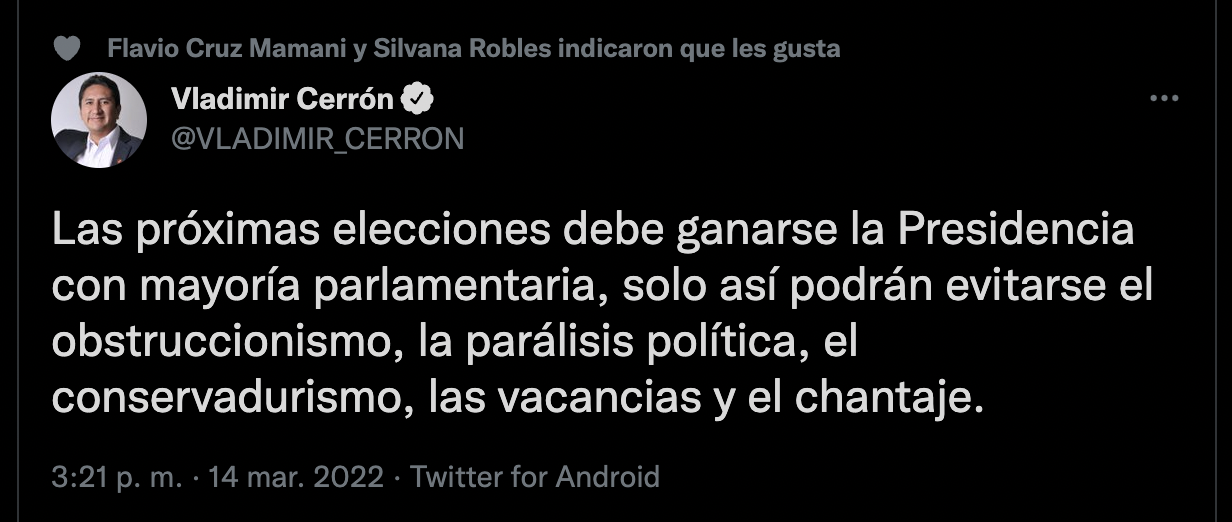
The secretary general of Peru Libre, Vladimir Cerrón, spoke on his social networks about the upcoming presidential elections in Peru, stressing that in order for there to be no longer a vacancy process, the majority of people must be held in parliament.
“The next elections must win the Presidency with a parliamentary majority, only in this way can obstructionism, political paralysis, conservatism, vacancies and blackmail be avoided,” his tweet reads.

All this referring to the fact that the Congress of the Republic approved yesterday the debate to carry out the motion of vacancy against the President of the Republic, Pedro Castillo. It should be noted that it is the third proposed in eight months of government, but the only one that has advanced to this point.
A total of 76 congressmen voted in favor of the vacancy, 41 against and one abstention. The application promoted by Congressman Jorge Montoya for Popular Renewal had 50 signatures and for continuing the removal process requires at least 52 signatures.
The vacancy motion document accuses Castillo Terrones of moral incapacity and specifies “contradictions and lies of President Castillo in tax investigations”, the questionable designation of the ministries of the State, as well as his statements about his intention to grant an outlet to the sea to Bolivia.
Following Pedro Castillo's presentation, the Board of Directors of Congress indicated that the presidential vacancy be voted on Monday, March 28 at 3:00 p.m.
PEDRO CASTILLO WILL GIVE SPEECH
The Chief of the Ministerial Cabinet, Aníbal Torres Vasquez, last Friday requested that the plenary session of the Congress of the Republic receive the president to give a message this Tuesday, March 15. On Monday, the Board of Spokespersons agreed to accede to the president's request and will receive it at 5 p.m., said the head of Parliament, Maria del Carmen Alva.
In a letter sent to Alva on March 11, the Executive announced that on March 9, at the ordinary session of the Council of Ministers, President Castillo's message was approved to be presented before the plenary session of the national representation.
The agreement, the document specifies, was given within the framework of the provisions of article 118, paragraph 7, of the Political Constitution of Peru. The Magna Carta states that among the powers and duties of the President of the Republic is “to send messages to Congress at any time and compulsorily, personally and in writing, when the first ordinary annual legislature is installed”.
WHAT CAN THE PRESIDENT TALK ABOUT TODAY?
On the afternoon of Monday 14, the head of the Board of Directors of Parliament, María del Carmen Alva, asked her not to mention the presidential vacancy. However, the president is not obliged to obey his request.
“The Constitution establishes only one subject, subject matter of the presidential message, as mandatory when it comes to the message that the president addresses at the beginning of the annual legislature. There, the Constitution says what it should be about, but from there messages that the president sends to Congress at another time, it can be about any subject, because the Constitution does not establish any limitations,” constitutional lawyer Omar Cairo told the newspaper La República.
He said that while Alva Prieto may ask the head of state to omit certain points in his speech, this is just a suggestion. You can't demand what to say and what not to say.
“(María del Carmen Alva) can ask (Pedro Castillo) to talk about a certain subject and not to talk about another, but as a request, as an exhortation, it does not force it to the president. He can absolutely talk about what he considers pertinent,” Cairo said.
KEEP READING
Últimas Noticias
Debanhi Escobar: they secured the motel where she was found lifeless in a cistern
Members of the Specialized Prosecutor's Office in Nuevo León secured the Nueva Castilla Motel as part of the investigations into the case

The oldest person in the world died at the age of 119
Kane Tanaka lived in Japan. She was born six months earlier than George Orwell, the same year that the Wright brothers first flew, and Marie Curie became the first woman to win a Nobel Prize

Macabre find in CDMX: they left a body bagged and tied in a taxi
The body was left in the back seats of the car. It was covered with black bags and tied with industrial tape
The eagles of America will face Manchester City in a duel of legends. Here are the details
The top Mexican football champion will play a match with Pep Guardiola's squad in the Lone Star Cup

Why is it good to bring dogs out to know the world when they are puppies
A so-called protection against the spread of diseases threatens the integral development of dogs




